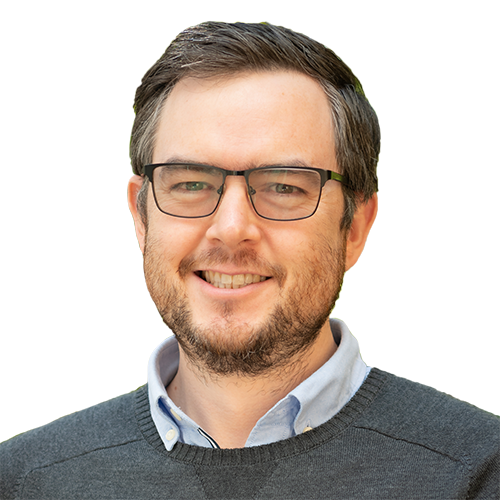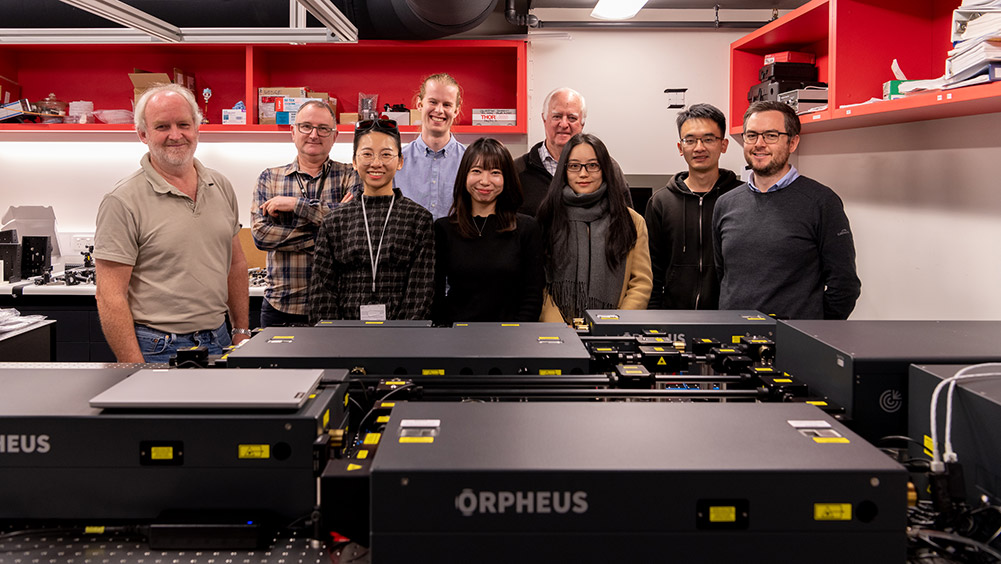
Chris Hall
University of Melbourne
It's hard to imagine a better way to do research because it brings together people from different areas that you probably wouldn't normally interact with, with unique skills that you may not have realised that you needed initially.”
Pursuit of knowledge drives our newest Future Fellow
For Chris Hall, the path from country kid to emerging leader within the Exciton Science family has been a journey fuelled by curiosity.
Chris is a senior postdoctoral researcher in the Ultrafast and Microspectroscopy Laboratories at the University of Melbourne’s School of Chemistry.
In 2021, he was awarded an ARC Future Fellowship, which enables outstanding Australian mid-career researchers to undertake high-quality research in areas of national and international benefit.
Chris will use the grant to develop new tools to study photochemical systems, a fitting next chapter for someone whose first steps into scientific discovery were bathed in warm sunlight.
Raised near Nagambie, a small town 140km north of Melbourne, social distractions were few and far between for Chris, who focused instead on the engaging environment around him.
“I grew up in Regional Victoria,” he said.
“We're 10 minutes from the nearest town, it’s an hour and 15 minutes on the bus to school each way.
“We lived in the middle of nowhere. You had a lot of time to consider the natural world and we were very fortunate in that being out there, there’s these brilliant night skies with no light pollution.
“All of that fed into an appreciation and interest in the natural world and science in general.”
After high school, Chris embarked on tertiary education and postgraduate research not with a clear career goal in mind, but rather the simple determination to continue pursuing activities he was passionate about.
“I’d always been encouraged to do what I thought was interesting and what motivated me,” he said.
“And that's how I felt coming out of university. I was doing it because it was interesting and I was enjoying what I was doing.”
Chris completed his PhD at Swinburne University and worked in the ARC Centre of Excellence for Coherent X-ray Science (CXS), before moving to the University of East Anglia in the UK.
He returned to Australia to join the University of Melbourne and Exciton Science in 2017, bringing with him expertise and experience that has benefited the Centre, and led to deserved individual recognition in the form of a major international research award in 2019, and his Future Fellowship in 2021.
“The work I was doing in the UK was very different to anything anyone was doing in Australia,” he said.
“At that time, there was no facility for ultrafast transient infrared spectroscopy or Raman spectroscopy in Australia. I really wanted to bring those tools and techniques that I've learned about in UK back here, because of their potential to provide new information and support discoveries in the materials sciences.
“The idea of discovering new things, developing tools and methods that give you new information you can't extract using any other methods - that's what does it for me.”
Within Exciton Science, Chris has formed important collaborations between members at many universities inside and outside the Centre, leading to his work being published in prestigious journals such as Nature Materials.
“It's a fantastic environment to do research in,” he said.
“It feels like a very extended family. Centre meetings are almost like a family reunion.
“If you have a question, you know you can just walk up to someone and ask them, and they'll help you out if they can. If there's something you really need, you can just call them on Teams and you can be talking in 10 minutes’ time.
“It's hard to imagine a better way to do research because it brings together people from different areas that you probably wouldn't normally interact with, with unique skills that you may not have realised that you needed initially.
“But as you go further down the track, you come to realise that these new connections are invaluable and enable investigations that were likely inconceivable when the Centre was first envisaged.”
A major focus for Exciton Science in recent years has been seeking to achieve greater gender equity and ethnic diversity within the Centre.
While men have traditionally dominated STEM fields, and the legacy of that imbalance persists, Chris is emphatic about the importance of making everyone feel welcome in the lab, regardless of their background or life experience.
“It's very well established that a diverse and inclusive workplace is more productive and more creative,” he said.
“And they're really the core tenants of a successful research team.
“If you can be creative, you can approach problems from different angles, which is brought about by people from different backgrounds, different research interests, different ways of thinking when approaching problems.
“That's going to lead to a workplace that's going to have far better outcomes.”
The last two years have proven enormously challenging for the research sector, with COVID-19 shutdowns negatively impacting experiments and impeding career progress or student projects.
Although Chris and his colleagues have not been spared from these problems, he is grateful for the support of Exciton Science and the sense of community the Centre has provided during one of the hardest periods in the sector’s history.
“As an experimentalist, it's been challenging,” he said.
“There's only so much you can do on your kitchen bench. You can't do high-end, advanced spectroscopy with a torch and compact spectrometer.
“I think the Centre’s been extremely flexible and considerate, we were very lucky to have been with the Centre during this time. When a lot of institutes and a lot of people have had limited options, the Centre has been there to support us through it.
“But we are finding a way through this difficult time, because we are all working towards a common objective and we're all motivated to get there. If you're having a bad day, the Centre pulls you along and if you're having a good day, then you help pull someone else along. It's very much a community feel to it, which you probably wouldn't have, if you're in a smaller research group or team.”
